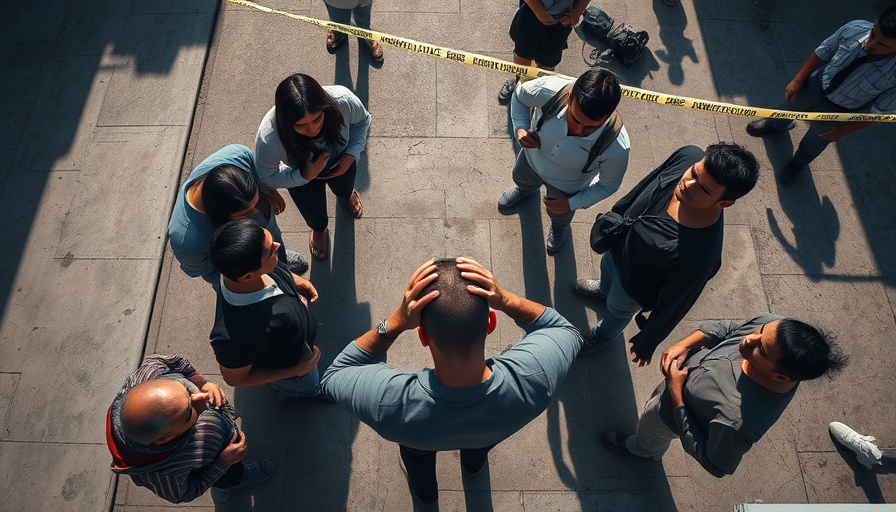
Tragic Moments in Little Santo Domingo: A Community's Heartbreak
In the early hours of Tuesday morning, an unexpected disaster struck the heart of Santo Domingo, affecting not just the Dominican Republic but also reverberating deeply within Miami's Dominican community. The catastrophic collapse of the roof at the renowned Jet Set nightclub resulted in the death of over 70 people and left more than 150 injured. Among the victims were prominent figures beloved in the community, including former Major League Baseball stars Octavio Dotel and Tony Blanco, along with celebrated singer Rubby Pérez—who tragically lost his life just after performing on stage.
A Close-Knit Community Grieves Together
In Miami's bustling Little Santo Domingo neighborhood, the atmosphere is somber as residents grapple with their loss. Rafael Gutierrez, owner of a local Dominican grocery store, expressed his devastation: "Lamentablemente, yo perdí cuatro amistades. Unfortunately, I lost four of my friends." He received the news early that morning, illustrating the tragedy's immediate and profound effect on friends and families. These are more than just names; they are part of a cultural tapestry interwoven with laughter, memories, and a shared history.
Another community member, Pablo Yunes, encapsulated the feeling of collective mourning by stating, "It's very sad. We're all still in shock." Conversations among neighbors now revolve solely around the event and its repercussions—reminding everyone of the fragility of life and the importance of community bonds during such tragic times.
Understanding the Collapse: What We Know So Far
The cause of the Jet Set nightclub's collapse remains unclear. Dominican authorities are currently probing the details of the incident as rescue operations continue. Eyewitnesses reported hearing a thunderous noise followed by chaos as everyone tried to escape, but rescue crews have continued their search through the debris, hoping to find any survivors still trapped beneath.
Edwin Madrigal, another local resident, voiced the anger and sorrow felt by many—"This should've never happened. Everybody is hurting, everywhere in the world. It's a tragedy." His sentiment captures the outrage that a venue, meant for joy and connections, could turn into a site of mourning.
The Impact on Miami's Dominican Diaspora
The collapse has shaken not just individuals but also the broader Dominican diaspora in South Florida, where many families have deep ties to the island. As they await news of loved ones, many are sharing their grief on social media, creating digital memorials that speak to a larger issue: the strength of community resilience in times of despair.
A community member reflected poignantly, stating, "This is a shame. My condolences to all the families at this moment." Many feel as though their hearts are heavy, shared burdens uniting them across the Caribbean.
Finding Comfort in Shared Grief
In the wake of such a tragedy, Miami’s Dominican community is finding comfort in shared grief. Events have been organized where people can come together, share stories of those lost, and support each other as they navigate this painful moment in their collective history. These gatherings are essential—they’re not merely about remembrance but showcasing the resilience and unity of a community that refuses to let tragedy define them.
As families continue to hold vigils and discuss their hopes for a better future, there lies a broader reminder of the importance of safety regulations and the accountability of venues that host public events. Community leaders are advocating for a more rigorous examination of safety protocols while calling attention to the need for emotional support as they process the aftermath of this catastrophe.
Looking Forward: What Can We Learn?
The recent events serve as a stark reminder of the potential vulnerabilities in entertainment spaces. They raise crucial discussions regarding safety protocols in public venues, especially those frequented by large crowds. Advocates within the community are urging local authorities both in the Dominican Republic and the United States to reflect on these incidents and to nurture an environment where safety is prioritized, potentially saving lives in the future.
Ultimately, the tragedy has sparked initiatives focused on community support—both emotional and physical. Whether through community meetings or broader conversations with the Dominican Republic, the message remains clear: the time to act for reform and healing is now.
As Miami's Dominican community continues to process this tragedy, the resilience and strength displayed in these times of sorrow reaffirm their connection to one another. For those interested in supporting affected families or joining community efforts, local organizations are actively gathering resources and donations to assist survivors and remember those lost.
It’s crucial, in times like these, to stand together and provide meaningful support, reflecting the spirit of solidarity that defines the Dominican community.
 Add Row
Add Row  Add
Add 




Write A Comment